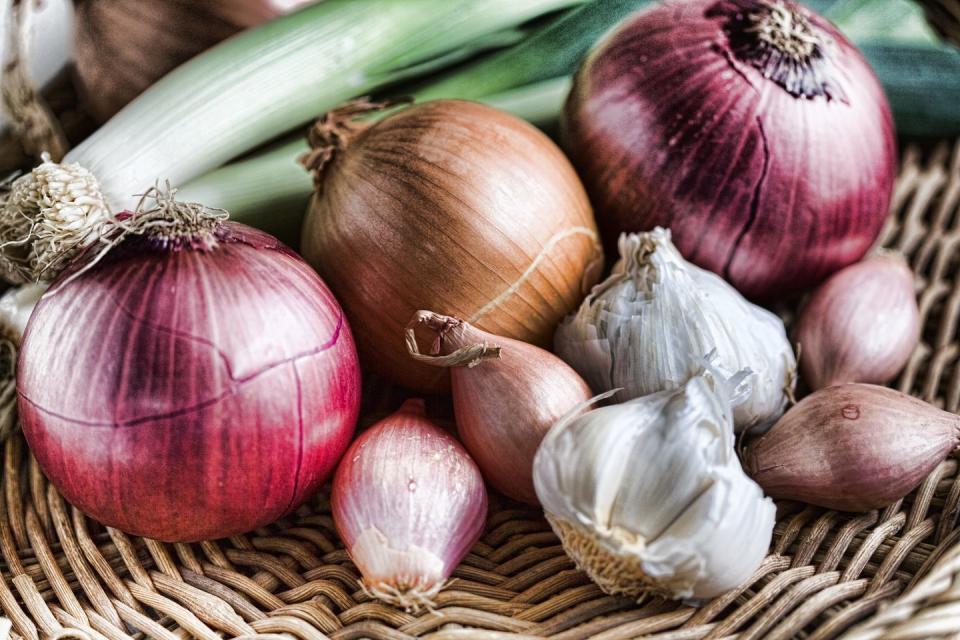5 Reasons You Should Be Eating More Onions

Onions do more than just flavor your favorite soups, stir fries, and salads. Whether yellow or brown, white or red, these versatile veggies also add vitamins, minerals, antioxidants, and fiber to your plate. The good-for-you compounds in onions can ultimately help protect your heart, immune system, and more all while making your entrées, apps, and sides shine.
"Onions are an affordable and flavorful addition to any meal that pack in a dose of antioxidants and serious health benefits," says Stefani Sassos, MS, RDN, Registered Dietitian for the Good Housekeeping Institute.
Give onions — and other members of the allium family such as garlic, scallions, leeks, shallots, and chives — credit where credit is due. These veggies provide a number of advantages as part of a plant-rich diet.
Nutrition Stats (medium onion)
44 calories
13g carbohydrates
1g protein
<1g total fat
<1g saturated fat
2.5g fiber
6g sugar
216mg potassium
15mg magnesium
11mg vitamin C
0.178mg vitamin B6
Onion health benefits:
Onions are nutrient- and flavor-rich.
Onions are a good source of vitamin C, vitamin B6, folate, potassium, and manganese. Plus, they provide a little dietary fiber. The veggies can also add a lot of flavor to dishes without greatly increasing calories, sodium, or cholesterol, meaning they're a great substitute for salty sauces or marinades when you're looking for some extra zip.
Eating onions can boost your heart.
Onions may help out in the cardiovascular department, some research shows. The naturally occurring compounds within the bulbs' layers can help fight inflammation and lower cholesterol levels, thereby protecting against heart disease. Research on one particular polyphenol in onions — quercetin — has linked it with lowering blood pressure, too. Red onions in particular contain higher amounts of quercetin, so opt for the more colorful varieties for an extra boost.
It may also strengthen your immune system.
In addition to containing immune-boosting vitamin C, onions provide phytochemicals that can help your body's defense system out. The antioxidants within them encourage a strong immune system, and other compounds like sulfides assist with protein synthesis.

Eating more onions may reduce your cancer risk.
"Allium vegetables, like onions and garlic, are rich in antioxidants and thought to have anti-inflammatory effects," says Sassos, a board-certified specialist in oncology nutrition. "They provide organosulfur compounds that can reduce the risk of certain cancers including prostate cancer. They make an excellent addition to any cancer prevention diet."
People who consumed a large amount of alliums were less likely to develop gastric cancer, per a 2014 meta-analysis of 27 studies. Another review of 16 studies also linked high-allium consumption with a lower risk of colon cancer.
It may promote good digestion too.
The dietary fiber in onions can help your digestive system stay in tip-top shape. These prebiotic compounds promote the growth of good gut bacteria, a.k.a. probiotics. In turn, these living organisms prevent or manage GI issues and help out your immune system at the same time.
What's more, the specific type of fiber found in onions (as well as garlic, wheat, and legumes) may more effectively feed the beneficial microbiota than the fiber found in other foods, a 2018 meta-analysis found.
That said, not everyone should chow down on onions for digestive health. "Although onions exhibit prebiotic activity which can enhance intestinal health in many people, individuals who suffer from IBS or are following a low-FODMAP diet may want to limit their consumption," Sassos warns. "Onions are particularly high in the FODMAP fructans, which can be poorly absorbed in the small intestine and exacerbate IBS symptoms."
You Might Also Like

 Yahoo Finance
Yahoo Finance 